
The Vaudeville Theatre is a West End theatre on the Strand in the City of Westminster. As the name suggests, the theatre held mostly vaudeville shows and musical revues in its early days. It opened in 1870 and was rebuilt twice, although each new building retained elements of the previous structure. The current building opened in 1926, and the capacity is now 690 seats. Rare thunder drum and lightning sheets, together with other early stage mechanisms, survive in the theatre.

William Terriss, born as William Charles James Lewin, was an English actor, known for his swashbuckling hero roles, such as Robin Hood, as well as parts in classic dramas and comedies. He was also a notable Shakespearean performer. He was the father of the Edwardian musical comedy star Ellaline Terriss and the film director Tom Terriss.
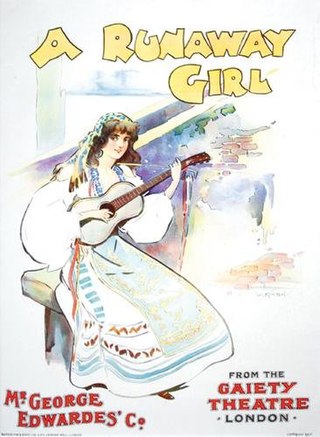
A Runaway Girl is an Edwardian musical comedy in two acts written in 1898 by Seymour Hicks and Harry Nicholls. The composer was Ivan Caryll, with additional music by Lionel Monckton and lyrics by Aubrey Hopwood and Harry Greenbank. It was produced by George Edwardes at the Gaiety Theatre, London, opening on 21 May 1898 and ran for a very successful 593 performances. It starred Hicks's wife, Ellaline Terriss and the comic actor Edmund Payne.

Sir Edward Seymour Hicks, better known as Seymour Hicks, was a British actor, music hall performer, playwright, actor-manager and producer. He became known, early in his career, for writing, starring in and producing Edwardian musical comedy, often together with his famous wife, Ellaline Terriss. His most famous acting role was that of Ebenezer Scrooge in Charles Dickens's A Christmas Carol.

The Shop Girl was a musical comedy in two acts written by H. J. W. Dam, with Lyrics by Dam and Adrian Ross and music by Ivan Caryll, and additional numbers by Lionel Monckton and Ross. It premiered at the Gaiety Theatre in London in 1894 and ran for an extremely successful 546 performances. Its cast included Seymour Hicks, George Grossmith, Jr., Arthur Williams, Edmund Payne, and Ellaline Terriss. It soon played in New York and was successfully revived in London in 1920.

The Circus Girl is a musical comedy in two acts by James T. Tanner and Walter Apllant (Palings), with lyrics by Harry Greenbank and Adrian Ross, music by Ivan Caryll, and additional music by Lionel Monckton.
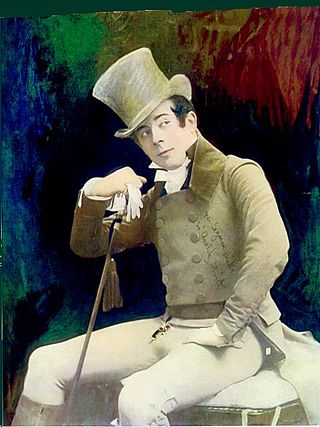
Quality Street is a comedy in four acts by J. M. Barrie, written before his more famous work Peter Pan. The story is about two sisters who start a school "for genteel children".

The Catch of the Season is an Edwardian musical comedy by Seymour Hicks and Cosmo Hamilton, with music by Herbert Haines and Evelyn Baker and lyrics by Charles H. Taylor, based on the fairy tale Cinderella. A debutante is engaged to a young aristocrat but loves a page.

Mary Ellaline Terriss, Lady Hicks, known professionally as Ellaline Terriss, was a popular British actress and singer, best known for her performances in Edwardian musical comedies. She met and married the actor-producer Seymour Hicks in 1893, and the two collaborated on many projects for the stage and screen.

The Beauty of Bath is a musical comedy with a book by Seymour Hicks and Cosmo Hamilton, lyrics by C. H. Taylor and music by Herbert Haines; additional songs were provided by Jerome Kern, F. Clifford Harris (lyrics) and P. G. Wodehouse (lyrics). Based loosely on the play David Garrick, the story concerns a young woman from a noble family, who falls in love with an actor. She then meets a sailor who appears identical to the actor and mistakes him for the latter. Her father objects to a marriage with the actor, but when it turns out that she really loves the sailor, all objections fall away.
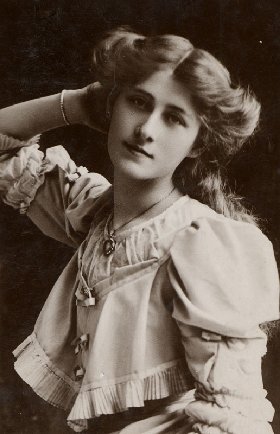
Phyllis Dare was an English singer and actress, famous for her performances in Edwardian musical comedy and other musical theatre in the first half of the 20th century.

Zena Dare was an English singer and actress who was famous for her performances in Edwardian musical comedy and other musical theatre and comedic plays in the first half of the 20th century.

Gaiety Girls were the chorus girls in Edwardian musical comedies, beginning in the 1890s at the Gaiety Theatre, London, in the shows produced by George Edwardes. The popularity of this genre of musical theatre depended, in part, on the beautiful dancing corps of "Gaiety Girls" appearing onstage in bathing attire and in the latest fashions. The 1890s Gaiety Girls were respectable, elegant young ladies, unlike the actresses from London's earlier musical burlesques. Later, even the stars of these musical comedies were referred to as Gaiety Girls.
David Garrick is a 1913 British black-and-white silent film based on the life of British actor David Garrick. The film starred Seymour Hicks and Ellaline Terriss and was based on the 1864 play David Garrick by T. W. Robertson, adapted by Max Pemberton. The film was directed by Leedham Bantock. Made by Hepworth Pictures at Walton Studios, it was three reels long.
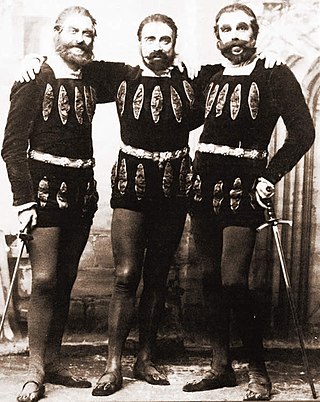
William Lugg was an English actor and singer of the late Victorian and Edwardian eras. He had a long stage career beginning with roles in several Gilbert and Sullivan operas and continuing for over four decades in drama, comedy and musical theatre. Later in his career, he appeared in nine silent films in the early years of British cinema.
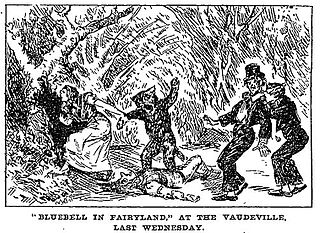
Bluebell in Fairyland is a Christmas-season children's entertainment described as "a musical dream play", in two acts, with a book by Seymour Hicks, lyrics by Aubrey Hopwood and Charles H. Taylor, and music by Walter Slaughter. It was produced by Charles Frohman. The creators sought to distinguish the work from a Christmas pantomime. The story concerns a flower girl, Bluebell, who on Christmas Eve goes to fairyland in search of the "Sleeping King", seeking to restore him to his throne, which has been usurped by the "Reigning King".
Sir Edward Seymour Hicks, better known as Seymour Hicks, was a British actor, music hall performer, playwright, screenwriter, theatre manager and producer. He became well known for writing, starring in and producing Edwardian musical comedy. Beginning in 1913, however, he had a significant film career. Hicks began in film during the silent era and continued to act in sound films.
Stanley Brett was a British musical comedy actor and comedian.

Leedham Bantock was a British singer, Edwardian musical comedy actor, early film director, dramatist and screenwriter. In 1912 he became the first actor to portray Father Christmas in film.

Aubrey Hopwood was a British lyricist of Edwardian musical comedy and a novelist and author of nonsense books for children. He co-wrote the lyrics for the musicals Alice in Wonderland (1886), A Runaway Girl (1898) and The Lucky Star (1899), among others.


















